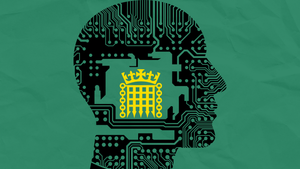Attempts to get AI transparency provisions into the Data Bill currently going through Parliament could come to an end this evening after the House Of Commons yet again rejected proposals added to the bill by the House Of Lords.
However, that does not mean debates around AI transparency will stop, warns Caroline Dinenage, Chair of Parliament’s Culture, Media & Sport Select Committee.
Measures added to the Data Bill by the government to placate their critics in the Lords are just “a thinly veiled attempt to kick the can down the road”, she says, warning ministers that if they think anyone is “fooled by this” - or that this will “quieten” people who want to “stand up for our world leading creative industries” - then they have “another thing coming”.
Criticising the government’s approach to copyright and AI in general, she goes on, “They have been gaslighting members of all parties who have attempted to draw attention to the situation”. As a result, the government has got itself “into a terrible pickle over this legislation”, not least by “starting a consultation on AI and copyright when they already had stated a preferred outcome”.
“They have been somehow pitting our world-leading creative industries against AI”, she adds, “almost presenting them as luddites who are allergic to innovation and technology, when actually these are some of the most groundbreaking and innovative sectors out there”.
Those Lords’ proposals would ultimately force AI companies to be transparent about what copyright protected works they have used when training their AI models, something the copyright industries - including the music industry - are keen to see become a legal requirement.
The government doesn’t want to regulate AI through the Data Bill, saying it will present bespoke legislation covering AI matters at a later date.
However, it has put some commitments into the Data Bill regarding the work it will undertake to prepare for that specific legislation which, culture minister Chris Bryant insisted in the House Of Commons yesterday, shows that the government hasn’t just ignored the AI and copyright concerns expressed in the Lords.
“We have listened to the other House and taken action”, Bryant said. “There may be disagreements about the measures we have taken”, he added, “but it would be wrong to say that we have not listened”. To that end, he concluded, “it is time for the Houses to agree that the bill must go forward”.
Last week the Lords rejected the government’s version of the Data Bill for the fourth time. It will now consider the version passed by the Commons yesterday this evening. However, the member of the Lords who has been leading the charge on the AI transparency provisions, film-maker Beeban Kidron, indicated last week that she would not seek to block the Data Bill for a fifth time.
Bryant noted that commitment yesterday, stating that Kidron is right to give up at this point because the wishes of the House Of Commons, as the elected chamber, should prevail.
“In the end”, he said, “only one House is elected; only one House constitutes the government of the day”, and - when key elements of the Data Bill were set out ahead of last year’s General Election - it’s right that “the unelected House treads carefully”.
For the creative industries, the “unelected House” has become a key ally in the big battles around copyright and AI, with many feeling that the government and its MPs that make up the majority in the House Of Commons are too keen to please the AI sector, even if that means weakening UK copyright law.
Bryant has been very keen to stress that that’s not the case, and that the government will address both the copyright and transparency obligations of AI companies via its bespoke AI legislation, informed by the massive consultation on copyright and AI that it undertook earlier this year.
Meanwhile the government’s AI minister, Peter Kyle - accused of being far too close to the AI sector - has been keen to insist that the government is still considering all options for dealing with copyright and AI, despite previously stating it preferred the option of introducing a new copyright exception to benefit AI companies.
In a bid to placate its critics in the Lords, the government previously committed to undertake various pieces of research relating to AI.
In the latest draft of the Data Bill, it brought forward the deadline for completing that work, committed to provide an update in six months, and committed to set up a cross-party working group. However, none of that has really placated the government’s critics in Parliament - or across the creative industries.
The continued frustration of the creative industries was expressed in the Commons yesterday by Dinenage. While welcoming the commitments made by ministers on the reports and a working group, she added that “they miss the point of the creative industries’ concern that their work and intellectual property are being exploited wholesale, without permission, without payment and without practical means of recourse and redress”.
The government's commitments in the Data Bill, therefore, are “a thinly veiled attempt to kick the can down the road”. But, she stressed, if they “think that any of us are fooled by this, or that it will quieten those who want to stand up for our world-leading creative industries and against the existential threat that they face, he has another thing coming”.

